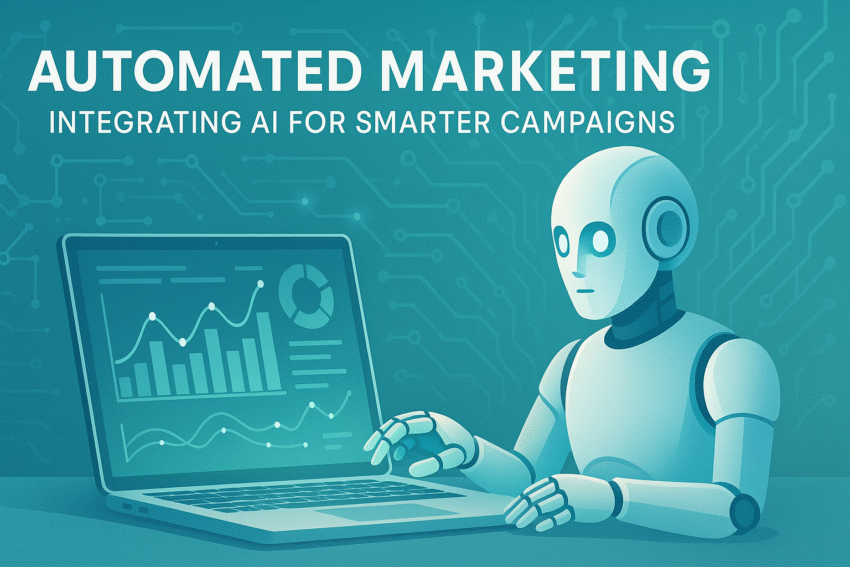Automated Marketing: Integrating AI for Smarter Campaigns
Welcome to the future of marketing! In today’s fast-paced digital landscape, businesses are constantly seeking innovative ways to captivate their audience. One of the most effective methods is through automated marketing powered by artificial intelligence (AI). 🚀 Let’s dive into how integrating AI can make your marketing campaigns smarter, more efficient, and highly personalized.
Table of Contents
1. What is Automated Marketing?
2. Benefits of AI in Marketing
3. How to Integrate AI into Your Campaigns
4. Real-World Examples
5. Conclusion
6. FAQs
What is Automated Marketing?
Automated marketing refers to the use of software to automate repetitive marketing tasks. This includes email campaigns, social media posts, and ad management. By integrating AI, automated marketing becomes even more powerful, enabling businesses to deliver personalized experiences at scale. Imagine having a 24/7 marketing assistant that never sleeps! 🛌
Benefits of AI in Marketing
Integrating AI into your marketing strategy offers a multitude of benefits:
1. Enhanced Personalization 🎯: AI analyzes vast amounts of data to understand consumer behavior. This means you can tailor your messages to individual preferences, boosting engagement and conversion rates.
2. Increased Efficiency ⏱️: AI automates tedious tasks, freeing up your team’s time to focus on creative strategies. This efficiency not only saves time but also reduces costs.
3. Improved Analytics 📊: With AI, you gain deeper insights into your campaign performance. AI tools can predict trends, helping you make informed decisions and stay ahead of the competition.
How to Integrate AI into Your Campaigns
Ready to take the plunge? Here are some steps to get started with AI in your marketing campaigns:
1. Identify Your Goals 🎯: Determine what you want to achieve with AI. Whether it’s increasing sales, improving customer service, or enhancing brand awareness, having clear goals is crucial.
2. Choose the Right Tools 🛠️: There are numerous AI tools available. Research and select those that align with your objectives. Some popular options include chatbots, predictive analytics, and recommendation engines.
3. Train Your Team 👩💻: Ensure your team is equipped to work with AI-powered tools. Provide necessary training and resources to keep them updated with the latest technologies.
4. Monitor and Optimize 📈: Regularly assess the performance of your AI-driven campaigns. Use data insights to tweak strategies and maximize results.
Real-World Examples
Let’s look at how some leading companies are leveraging AI in their marketing:
1. Netflix 🎥: By analyzing viewer preferences, Netflix recommends shows and movies tailored to individual tastes, keeping users engaged and subscribed.
2. Amazon 🛒: Through AI, Amazon provides personalized shopping experiences with product recommendations based on past purchases and browsing history.
Conclusion
Embracing AI in automated marketing is not just a trend; it’s a necessity for businesses aiming to thrive in the digital age. By harnessing the power of AI, you can create smarter, more impactful campaigns that resonate with your audience. So, why wait? Start integrating AI into your marketing strategy today and watch your business soar! 🚀
FAQs
Q: How does AI improve marketing efficiency?
A: AI automates repetitive tasks, provides data-driven insights, and personalizes customer interactions, making marketing efforts more efficient and effective.
Q: Is AI suitable for small businesses?
A: Absolutely! AI tools are scalable and can be tailored to fit the needs and budget of small businesses, providing them with competitive advantages.
Q: What are some common AI tools used in marketing?
A: Popular AI tools include chatbots for customer service, predictive analytics for trend forecasting, and recommendation engines for personalized marketing.
Q: Can AI replace human marketers?
A: No, AI is designed to augment human capabilities, not replace them. It handles data-driven tasks, allowing marketers to focus on strategic and creative aspects.
Q: How can I start implementing AI in my marketing strategy?
A: Begin by identifying your marketing goals, choosing the right AI tools, training your team, and continuously monitoring and optimizing your campaigns.


